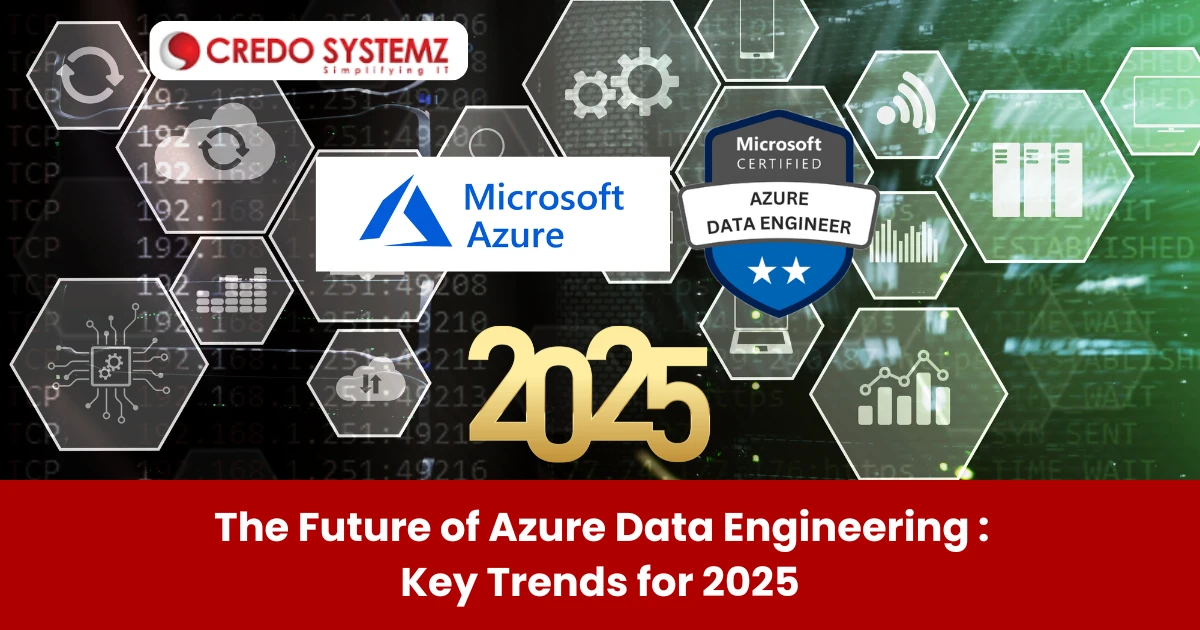
Introduction
As data plays a major role in today’s tech world, data engineering remains at the forefront of innovation. It enables businesses to extract, transform, and utilize data effectively. Azure is the leading choice for data engineering solutions due to its comprehensive tools and services.
The Rise of AI-Driven Data Engineering
AI and machine learning are transforming the way of building and maintaining data pipelines. The AI integrated with Azure tools to leverage predictive analytics and automation to improve efficiency. Azure provides various AI-powered tools, such as:
- Azure Synapse Analytics,
- Azure Machine Learning,
- Cognitive Services.
The AI-powered tools are used to perform data related tasks, like:
- Automate repetitive tasks like schema detection and anomaly detection in data pipelines.
- Optimize data processing workflows using predictive models.
- Enhance data quality with AI-driven cleansing and transformation tools.
Expansion of Serverless Data Solutions
The popularity of serverless architectures increases due to cost-effectiveness, scalability, and ease of use. Azure’s Event Hub, Data Factory, and Function Apps allow data engineers to create serverless workflows for data ingestion, transformation, and analysis. By 2025, the adoption of serverless data platforms like Azure Stream Analytics increases for real-time data processing. The integration between serverless compute and storage options simplifies data pipeline development. More granular cost optimization will be created for serverless data processing.
Unified Analytics Platforms
Organizations are increasingly demanding unified analytics platforms like Microsoft Azure fabric to manage their data lifecycle. Azure Synapse Analytics is leading by combining big data and data warehouse capabilities. In the near future, we can expect:
- Further convergence of Azure Synapse with tools like Azure Data Lake and Power BI to deliver unified analytics experience.
- Advanced features for hybrid data management, enabling seamless on-premises and cloud integration.
- Expanded support for multi-modal data processing, integrating structured, unstructured, and semi-structured data.
Emphasis on Real-Time Analytics
The demand for real-time insights is growing across industries, such as IoT, finance, and healthcare. Azure offers robust solutions for real-time data ingestion and processing, like Azure Stream Analytics and Azure IoT Hub. The advancements anticipated in the future are:
- Enhanced low-latency processing capabilities.
- Advanced anomaly detection and predictive analytics integrated directly into real-time pipelines.
- Greater support for streaming data visualization using tools like Power BI.
Democratization of Data Engineering
Low-code and no-code solutions are making data engineering accessible to non-technical users using:
- Azure Data Factory’s Mapping Data Flows
- Power Platform’s Power Automate
This new trend results in more intuitive interfaces for building complex data workflows. It creates AI-powered recommendations for pipeline optimization. It Increases the collaboration between business analysts and data engineers.
Advanced Data Governance and Security
To achieve robust data governance, Azure’s security offerings includes:
- Azure Purview,
- Azure Active Directory,
- Azure Security Center.
By 2025, we foresee:
- Enhanced automation for data classification and tagging.
- Broader integration of privacy-preserving computation techniques like homomorphic encryption.
- Real-time compliance monitoring and reporting capabilities.
The Era of Edge Computing and IoT
As edge devices proliferate, the need for distributed data processing is growing.nData engineers build pipelines closer to the data source using Azure IoT Edge and Azure Percept. The future holds:
- Improved integration of edge data pipelines with cloud services.
- Expanded support for AI inference at the edge.
- Greater emphasis on energy-efficient and sustainable edge computing solutions.
Sustainability in Data Engineering
As environmental concerns rise, businesses are looking for ways to reduce their carbon footprint. Azure’s commitment to sustainability will shape data engineering practices through initiatives like Carbon-aware SDKs and green data centers along with:
- Promoting energy-efficient data processing workflows.
- Providing tools for tracking and optimizing carbon emissions in data pipelines.
- Driving innovation in eco-friendly storage and compute solutions.
Conclusion
Finally, The future of Azure Data Engineering is bright, with cutting-edge technologies and trends poised to revolutionize how organizations harness their data. By embracing AI, serverless architectures, real-time analytics, and sustainability, Azure is positioned to remain a leader in the data engineering landscape. To master Azure skills, Credo Systemz offers Azure courses in Chennai. Data engineers who stay ahead of these trends will play a pivotal role in driving innovation and delivering value to businesses in 2025 and beyond.
This future promises immense opportunities for data engineers to innovate, optimize, and create data-driven solutions that power smarter decision-making. Credo Systemz provides data engineering courses to gain the skills of data engineering. Stay prepared to leverage these trends and reshape your data strategies with Azure!
Join Credo Systemz Software Courses in Chennai at Credo Systemz OMR, Credo Systemz Velachery to kick-start or uplift your career path.
